七年级英语上册 Unit6 Vocabulary
人教版七年级英语上册 Unit 6 知识归纳(含答案)
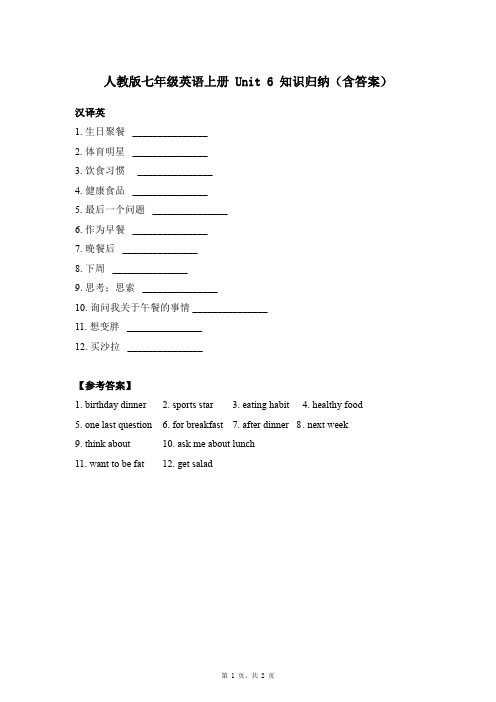
人教版七年级英语上册 Unit 6 知识归纳(含答案)汉译英1.生日聚餐_______________2.体育明星_______________3.饮食习惯_______________4.健康食品_______________5.最后一个问题_______________6.作为早餐_______________7.晚餐后_______________8.下周_______________9.思考;思索_______________10.询问我关于午餐的事情_______________11.想变胖_______________12.买沙拉_______________【参考答案】1. birthday dinner2. sports star3. eating habit4. healthy food5. one last question6. for breakfast7. after dinner8. next week9. think about10. ask me about lunch11. want to be fat12. get salad汉译英1. Cindy认为她妹妹喜欢冰激凌。
____________________________________ 2.那么咱们喝牛奶吧!____________________________________ 3. Jack喜欢什么蔬菜?____________________________________ 4.——咱们早饭吃什么?——水果沙拉怎么样?____________________________________ ____________________________________ 5.——Tom喜欢梨吗?——不,他不喜欢。
____________________________________ ____________________________________ 6.——你们午饭后吃草莓吗?——是的,我们吃。
七年级上册英语第6单元单词

七年级上册英语第6单元单词much /mʌtʃ/ pron.&adj. 许多;大量;多少How much...? (购物时)......多少钱?sock /sɔk/ n. 短袜T-shirt /'ti:ʃə:t/ n. T恤衫shorts /ʃɔ:ts/ n. (pl.) 短裤sweater /'swetə/ n. 毛衣trousers /'trauzəz/ n. (pl.) 裤子shoe /ʃu:/ n. 鞋skirt /skə:t/ n. 裙子dollar /'dɔlə/ n. 元(美国、等国的货币符号为$) big /big/ adj. 大的;大号的small /smɔ:l/ adj. 小的;小号的short /ʃɔ:t/ adj. 短的;矮的long /lɔ:ŋ/ adj. 长的woman /'wumən/ n. 女子Can I help you? 我能帮您吗?need /ni:d/ v. 需要look /luk/ v. 看;看上去pair /peə/ n. 一双;一对take /teik/ v. 买下;拿;取Here you are. 给你。
ten /ten/ num. 十eleven /i'levən/ num. 十一twelve /twelv/ num. 十二thirteen /θə:'ti:n/ num. 十三fifteen /fif'ti:n/ num. 十五eighteen /ei'ti:n/ num. 十八twenty /'twenti/ num. 二十thirty /'θə:ti/ num. 三十Mr. /'mistə/ 先生clothes /kləuðz/ n. (pl.) 衣服;服装store /stɔ:/ n. 商店buy /bai/ v. 购买;买sale /seil/ n. 特价销售;出售sell /sel/ v. 出售;销售;卖all /ɔ:l/ adj. 所有的;全部的very /'veri/ adv. 很;非常price /prais/ n. 价格boy /bɔi/ n. 男孩a pair of 一双。
英语七年级上册重点单词和句子
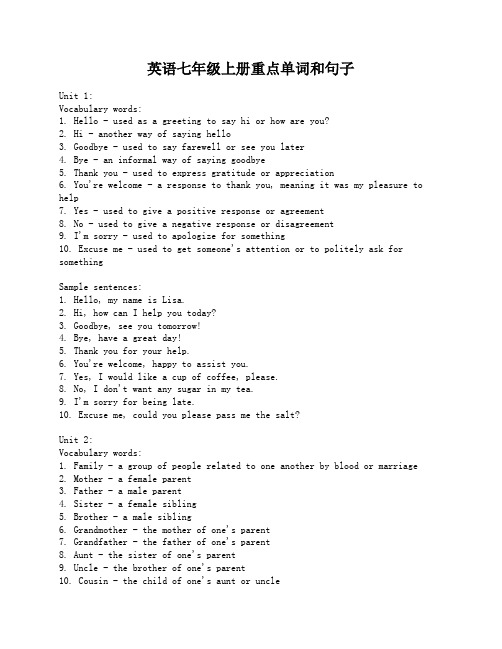
英语七年级上册重点单词和句子Unit 1:Vocabulary words:1. Hello - used as a greeting to say hi or how are you?2. Hi - another way of saying hello3. Goodbye - used to say farewell or see you later4. Bye - an informal way of saying goodbye5. Thank you - used to express gratitude or appreciation6. You're welcome - a response to thank you, meaning it was my pleasure to help7. Yes - used to give a positive response or agreement8. No - used to give a negative response or disagreement9. I'm sorry - used to apologize for something10. Excuse me - used to get someone's attention or to politely ask for somethingSample sentences:1. Hello, my name is Lisa.2. Hi, how can I help you today?3. Goodbye, see you tomorrow!4. Bye, have a great day!5. Thank you for your help.6. You're welcome, happy to assist you.7. Yes, I would like a cup of coffee, please.8. No, I don't want any sugar in my tea.9. I'm sorry for being late.10. Excuse me, could you please pass me the salt?Unit 2:Vocabulary words:1. Family - a group of people related to one another by blood or marriage2. Mother - a female parent3. Father - a male parent4. Sister - a female sibling5. Brother - a male sibling6. Grandmother - the mother of one's parent7. Grandfather - the father of one's parent8. Aunt - the sister of one's parent9. Uncle - the brother of one's parent10. Cousin - the child of one's aunt or uncleSample sentences:1. This is my family.2. My mother's name is Susan.3. My father works as a doctor.4. I have two sisters.5. He is my younger brother.6. My grandmother lives in the countryside.7. My grandfather tells me stories.8. My aunt is a teacher.9. My uncle likes to play football.10. My cousin is coming over for dinner.Unit 3:Vocabulary words:1. School - a place where students go to learn2. Classroom - a room in a school where students are taught3. Teacher - a person who teaches in a school4. Student - a person who studies at a school or college5. Book - a written or printed work consisting of pages glued or sewn together along one side and bound in covers6. Desk - a piece of furniture with a flat or sloping surface and typically with drawers, at which one can read, write, or do other work7. Chair - a separate seat for one person, typically with a back and four legs8. Pen - an instrument for writing or drawing with ink9. Pencil - a long, thin object used for writing or drawing, consisting of a stick of graphite or a similar substance enclosed in a wooden or metal case 10. Eraser - a device, typically made of rubber or plastic, used for removing pencil or ink marksSample sentences:1. I go to school every day.2. The classroom is quiet.3. My teacher is very friendly.4. I am a student in this school.5. I have a book to read.6. Please sit at your desk.7. The chair is comfortable.8. Can I borrow your pen?9. I need a pencil to write.10. Use an eraser to correct your mistake.Unit 4:Vocabulary words:1. Numbers - words or symbols that represent a particular quantity or amount2. One - the number after zero and before two3. Two - the number after one and before three4. Three - the number after two and before four5. Four - the number after three and before five6. Five - the number after four and before six7. Six - the number after five and before seven8. Seven - the number after six and before eight9. Eight - the number after seven and before nine10. Nine - the number after eight and before tenSample sentences:1. Can you count from one to ten?2. Two apples are on the table.3. My brother is three years old.4. I have four pencils in my bag.5. There are five students in our group.6. She has six dolls in her room.7. There are seven days in a week.8. We live in an eight-story building.9. There are nine chairs in the classroom.10. He is nine years old and a talented pianist.Unit 5:Vocabulary words:1. Colors - the property possessed by an object of producing different sensations on the eye as a result of the way the object reflects or emits light2. Red - the color of blood or fire3. Blue - the color of the sky or sea4. Green - the color of grass or leaves5. Yellow - the color of the sun or lemons6. White - the color of snow or milk7. Black - the absence of light8. Purple - a dark reddish-blue color9. Orange - the color of oranges or pumpkins10. Pink - a light red colorSample sentences:1. My favorite color is blue.2. The sky is blue on a clear day.3. The grass is green after the rain.4. I have a yellow dress for the party.5. White clouds float in the sky.6. Black cats are considered lucky in some cultures.7. The queen wore a purple robe.8. Orange is the color of autumn leaves.9. The sunset painted the sky pink.10. I mixed red and white to make pink.Unit 6:Vocabulary words:1. Food - any nutritious substance that people or animals eat or drink, orthat plants absorb, in order to maintain life and growth2. Bread - a basic food made from flour, water, and yeast or another leavening agent, mixed together and baked3. Rice - a staple food crop that is the seed of a plant of the grass family, which is grown in flooded paddy fields4. Meat - the flesh of an animal, as distinct from the bone or offal, used as food5. Fish - an aquatic craniate animal that lacks limbs with digits6. Fruit - the sweet and fleshy product of a tree or other plant that contains seed and can be eaten as food7. Vegetable - a plant or part of a plant used as food, typically as a savory dish or snack8. Milk - a white liquid produced by cows and other mammals to feed their young9. Water - a transparent, odorless, tasteless liquid, a compound of hydrogen and oxygen, H2O, that in a more or less impure state constitutes rain, oceans, lakes, rivers, etc.10. Sugar - a sweet crystalline substance obtained from various plants, especially sugar cane and sugar beet, consisting essentially of sucrose, and used as a sweetener in food and drinkSample sentences:1. I like to eat bread for breakfast.2. Rice is a staple food in many countries.3. Meat is a good source of protein.4. Fish is healthy and delicious.5. I love to eat fresh fruit.6. Vegetables are important for a balanced diet.7. Milk is a common ingredient in baking.8. Water is essential for life.9. Sugar adds sweetness to desserts.10. A variety of foods provide necessary nutrients.Unit 7:Vocabulary words:1. Weather - the state of the atmosphere at a particular place and time2. Sunny - characterized by bright sunshine3. Cloudy - covered with clouds4. Rainy - experiencing rain5. Windy - characterized by strong winds6. Stormy - affected by storms, especially involving thunder and lightning7. Snowy - covered with snow8. Hot - having a high degree of heat9. Cold - having a low temperature10. Warm - slightly hotSample sentences:1. Today is a sunny day.2. The sky is cloudy; it might rain later.3. I forgot my umbrella; it's rainy outside.4. The trees are swaying; it's windy today.5. There's a stormy weather forecast for tonight.6. The landscape looks beautiful covered in snow.7. It's too hot to go for a walk in the afternoon.8. The weather is quite cold in winter.9. It's warm in here; can we open a window?10. I enjoy the warm weather of spring.Unit 8:Vocabulary words:1. Time - the indefinite continued progress of existence and events in the past, present, and future regarded as a whole2. Hour - a period of time equal to a twenty-fourth part of a day and night and divided into 60 minutes3. Minute - a period of time equal to sixty seconds4. Second - a period of time equal to a sixtieth part of a minute5. Day - a period of 24 hours6. Week - a period of seven days7. Month - a period of a year divided into 12 parts8. Year - a period of 365 days (or 366 days in a leap year) starting from the first of January9. Morning - the period from sunrise to noon10. Evening - the period from noon to sunsetSample sentences:1. What time is it now?2. The meeting will last for one hour.3. I'll be back in a few minutes.4. Wait for a couple of seconds, please.5. We have a lot of activities planned for the day.6. The new magazine comes out every week.7. I get paid at the end of the month.8. Happy New Year! Wishing you all the best for the coming year.9. I like to exercise in the morning.10. In the evening, we usually have dinner together as a family.。
初中英语七年级上册Unit 6 Vocabulary
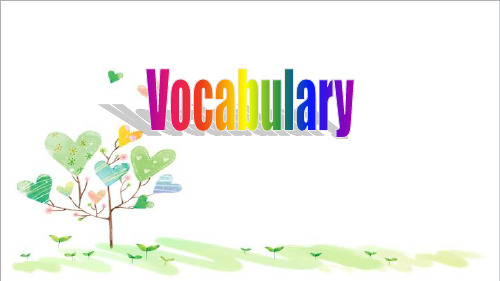
• 发/ʃ/和/ʒ/音时,舌尖和舌端抬向上齿龈较 后部,整个舌身抬起靠近上颚,形成一条 狭长的通道,双唇稍微向前突出,略成长 方形,不要呈扁唇,然后气流通过,摩擦 发音。常见的发/ʃ/音的字母及字母组合:s, c, sh, ch。如:sugar, social, shape, machine; 常见的发/ʒ/音的字母:s, g。如:
• beauty n. 美; 美丽
• bridge n. 桥 There is a bridge across the river.
• pond n. 池塘
• *snack n. 小吃 Many children like eating snacks.
• outside prep. 在……外面
Listening ~ More practice
Exercise 2: 根据中文提示完成句子。
1. Trees can prevent ____s_o_i_l ( 泥土) from
running away. 2. There is a train __t_im__e_t_ab(le时间表) on the
wall of the waiting-room.
• expensive adj. 昂贵的;花钱多的 Tom bought an expansive car last month.
• cheap adj. 便宜的;花钱少的 The skirt is very cheap.
• something pron. 某物 You need to eat something.
There are many famous places of interest in
• area n. 地域;地区 • traditional adj. 传统的 • modern adj. 现代的;近代的;现代化的 • sightseeing n. 观光;游览
新人教版七年级上册英语教案Unit

教学内容
1New words:like, banana, hamburger, tomato, broccoli, French fries, orange, ice, cream, salad, strawberry, pear, have,
小结与作业
课堂小结
本课作业
VIII. Homework
Make a survey.( The birthday presents for your parents )
What should you give your parents for their birthdays? What’s the best gift you have ever received? Pleasemake up a shopping list you could use to buy birthday presents for your parents.
( Help to say. )
Ss: Do you like pears/peaches/ grapes/bananas/…?
T: Yes, I do. / No, I don’t.
T: Can you write down my favorite fruit?
The Ss write them down.And see who write the faster and the best.
2 Ask some of them to read3aon page 29 from memory.
3.T: What’s this? ( It’s a soccer ball.)
人教版七年级上册英语第六单元第一课时教案设计
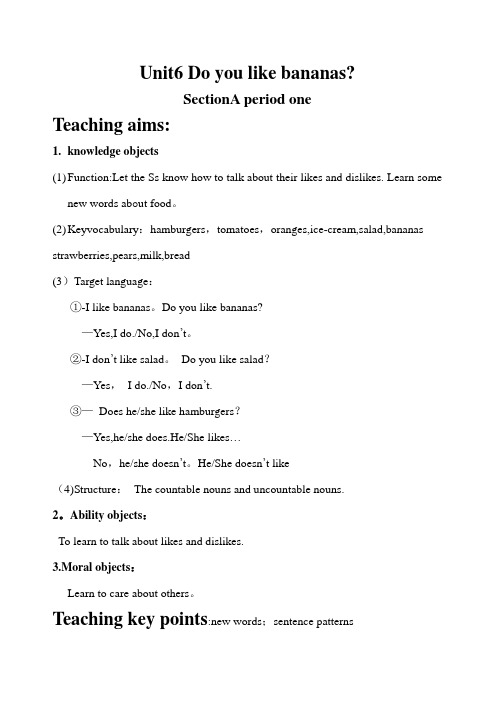
Unit6 Do you like bananas?SectionA period oneTeaching aims:1.knowledge objects(1)Function:Let the Ss know how to talk about their likes and dislikes. Learn somenew words ab o ut food。
(2)Keyvocabulary:hamburgers,tomatoes,oranges,ice-cream,salad,bananas strawberries,pears,milk,bread(3)Target language:①-I like bananas。
Do you like bananas?—Yes,I do./No,I don’t。
②-I don’t like salad。
Do you like salad?—Yes,I do./No,I don’t.③—Does he/she like hamburgers?—Yes,he/she does.He/She likes…No,he/she doesn’t。
He/She doesn’t like(4)Structure:The countable nouns and uncountable nouns.2。
Ability objects:To learn to talk about likes and dislikes.3.Moral objects:Learn to care about others。
Teaching key points:new words;sentence patternsTeaching difficult points:To talk about the countable nouns and uncountable nouns. Teachingmethods:Pairwork;Groupwork;Free talk;Listening Teaching aids:ppt; some real objectsTeaching procedures:Step1:Lead in(1)Show a ping—pong ball。
译林牛津英语七上Unit 6:同步练习(Vocabulary)
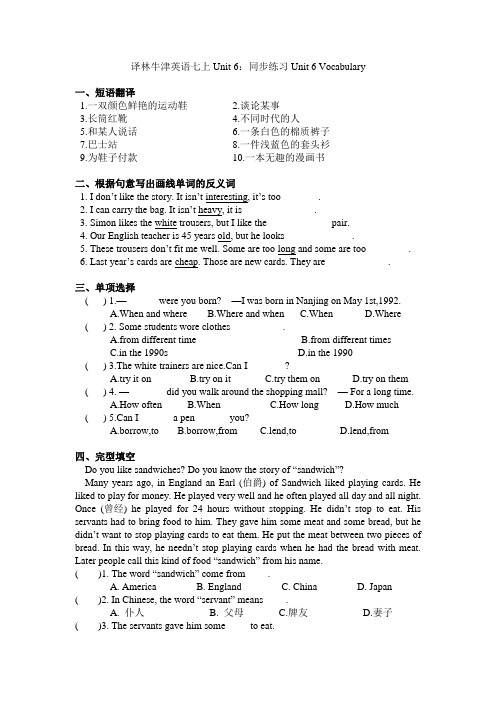
译林牛津英语七上Unit 6:同步练习Unit 6 Vocabulary一、短语翻译1.一双颜色鲜艳的运动鞋_________2.谈论某事_____________________3.长筒红靴_____________________4.不同时代的人__________________5.和某人说话___________________6.一条白色的棉质裤子_____________7.巴士站_______________________8.一件浅蓝色的套头衫_____________9.为鞋子付款___________________10.一本无趣的漫画书______________二、根据句意写出画线单词的反义词1. I don’t like the story. It isn’t interesting, it’s too _______.2. I can carry the bag. It isn’t heavy, it is ______________.3. Simon likes the white trousers, but I like the ____________ pair.4. Our English teacher is 45 years old, but he looks _____________.5. These trousers don’t fit me well. Some are too long and some are too ________.6. Last year’s cards are cheap. Those are new cards. They are ____________.三、单项选择( ) 1.—______ were you born? —I was born in Nanjing on May 1st,1992.A.When and whereB.Where and whenC.WhenD.Where ( ) 2. Some students wore clothes __________.A.from different timeB.from different timesC.in the 1990sD.in the 1990( ) 3.The white trainers are nice.Can I _______?A.try it onB.try on itC.try them onD.try on them ( ) 4. —_______ did you walk around the shopping mall? — For a long time.A.How oftenB.WhenC.How longD.How much ( ) 5.Can I ______ a pen ______ you?A.borrow,toB.borrow,fromC.lend,toD.lend,from四、完型填空Do you like sandwiches? Do you know the story of “sandwich”?Many years ago, in England an Earl (伯爵) of Sandwich liked playing cards. He liked to play for money. He played very well and he often played all day and all night. Once (曾经) he played for 24 hours without stopping. He didn’t stop to eat. His servants had to bring food to him. They gave him some meat and some bread, but he didn’t want to stop playing cards to eat them. He put the meat between two pieces of bread. In this way, he needn’t stop playing cards when he had the bread with meat. Later people call this kind of food “sandwich” from his name.( )1. The word “sandwich” come from ____.A. AmericaB. EnglandC. ChinaD. Japan ( )2. In Chinese, the word “servant” means ____.A. 仆人B. 父母C.牌友D.妻子( )3. The servants gave him some ____ to eat.A. meatB. breadC. fruitD.A and B ( )4. The Earl liked to play cards for ____.A. fun.B. moneyC. energyD. food ( )5. The Earl of Sandwich didn’t stop to eat because he ____.A. wasn’t hungryB. didn’t like sandwichesC. didn’t want to stop playing cardsD. had no time。
七年级上册英语第六单元笔记
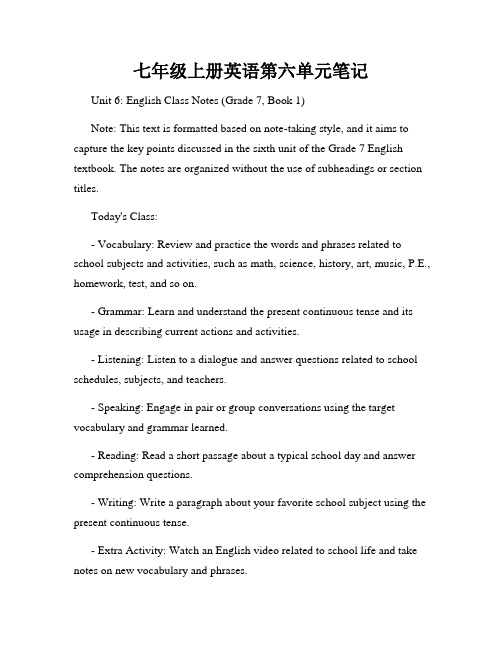
七年级上册英语第六单元笔记Unit 6: English Class Notes (Grade 7, Book 1)Note: This text is formatted based on note-taking style, and it aims to capture the key points discussed in the sixth unit of the Grade 7 English textbook. The notes are organized without the use of subheadings or section titles.Today's Class:- Vocabulary: Review and practice the words and phrases related to school subjects and activities, such as math, science, history, art, music, P.E., homework, test, and so on.- Grammar: Learn and understand the present continuous tense and its usage in describing current actions and activities.- Listening: Listen to a dialogue and answer questions related to school schedules, subjects, and teachers.- Speaking: Engage in pair or group conversations using the target vocabulary and grammar learned.- Reading: Read a short passage about a typical school day and answer comprehension questions.- Writing: Write a paragraph about your favorite school subject using the present continuous tense.- Extra Activity: Watch an English video related to school life and take notes on new vocabulary and phrases.Present Continuous Tense:- Formation: [Subject + am/is/are + verb+ing]- Usage:- Describe current actions and activities happening at the moment of speaking, e.g.,1. I am reading a book right now.2. They are playing soccer in the field.- Talk about temporary actions or situations happening around the present time, e.g.,1. She is studying for her exam this week.2. I am not eating dinner tonight; I have plans.- Special Cases:- Spelling changes: Verbs ending in consonant + vowel + consonant double the final consonant before adding -ing, e.g., run → running, swim → swimming.- Verbs ending in -e drop the -e before adding -ing, e.g., write → writing, dance → dancing.Listening Activity:- Listen to a dialogue between two students discussing their school schedules.- Answer questions based on the information provided.- Example questions:1. What subjects does Mary have in the morning?2. When does John have P.E. class?3. Who has history class on Tuesday?Reading Passage:- Read the following passage about a typical school day:"My name is Kate, and I am a seventh-grade student. Every morning, I wake up at 6:30 a.m. and have breakfast with my family. Then, I catch the school bus at 7:30 a.m. and arrive at school around 8:00 a.m. Our first class starts at 8:30 a.m., and we have six classes in total each day. I enjoy English and history the most. During the break, I usually play soccer with my friends. School finishes at 3:00 p.m., and I take the bus back home. In the evening, I do my homework and study for upcoming tests. I also take music lessons on Wednesdays and Fridays. My typical school day is quite busy but fulfilling."- Comprehension questions:1. What time does Kate wake up in the morning?2. How does Kate go to school?3. Which subjects does Kate like the most?Writing Activity:- Write a paragraph about your favorite school subject using the present continuous tense."My favorite school subject is science. Currently, we are conducting various experiments and learning about different scientific concepts. Our teacher is explaining the process of photosynthesis, and we are observing plant growth in our classroom. I am enjoying this hands-on experience as it helps me understand the subject better. Furthermore, we are also participating in a science fair where we will get the opportunity to showcase our projects. Overall, my experience with science is both exciting and enriching."Extra Activity:- Watch an English video related to school life.- Take notes on new vocabulary and phrases.- Example words/phrases:- Classroom, laboratory, blackboard, chalk, textbook, notebook, backpack, assignment, examination, group work, presentation, extracurricular activities, school assembly, schoolyard, recess, lunch break.Conclusion:Today's English class focused on vocabulary, grammar, listening, speaking, reading, and writing activities. We practiced the present continuous tense, discussed school subjects and activities, read a passage about a typical school day, and engaged in various speaking activities. By the end of the class, we gained a better understanding of the discussed topics and learned new vocabulary related to school life.。
初中英语牛津版七年级上Unit6Vocabulary

Do you know these clothes? jumper
skirt T-shirt
shorts
suit jacket
Do you still remember?
1. Amy is wearing a yellow ________ (套头衫).
jumper
2. Simon is wearing a pair of black
ong hite
Performance
Our fashion show
Today we are going to have a fashion. Some classmates are going to show us some clothes.
After that, please describe their clothes.
Now please enjoy the show.
How cool!
Work in groups
Model: S1: What is … wearing? S2: She is wearing a skirt. S1: What colour is it? S2: It’s white. S1: What’s it made of? S2:It’s made of cotton. S1: Is it comfortable? S2: Yes, it is.
初中英语牛津版7A
Unit 6
Fashion
Vocabulary
Revision
1. Kitty from Class 1, Grade 7
来自7年1班的凯蒂
2. welcome to our fashion show
欢迎来我们的时装秀 3. want to raise money for Project Hope 想要筹钱给希望工程
七年级上册英语第六单词
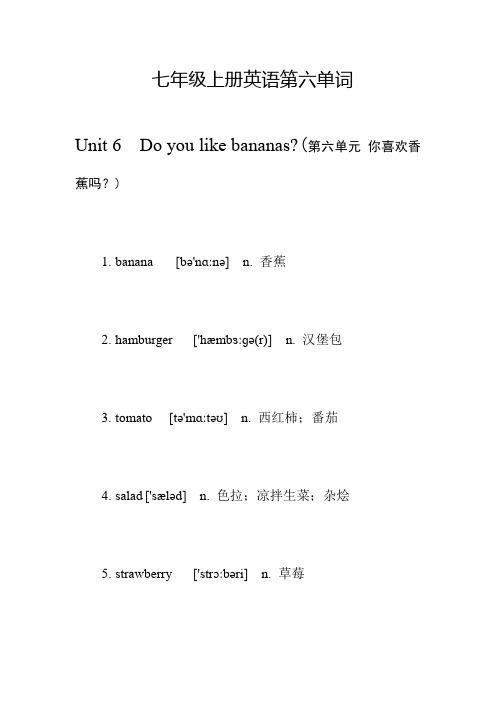
七年级上册英语第六单词Unit 6 Do you like bananas?(第六单元你喜欢香蕉吗?)1.banana[bə'nɑːnə] n. 香蕉2.hamburger['hæmbɜːɡə(r)] n. 汉堡包3.tomato[tə'mɑːtəʊ] n. 西红柿;番茄4.salad['sæləd] n. 色拉;凉拌生菜;杂烩5.strawberry['strɔːbəri] n. 草莓6.pear[peə(r)] n. 梨子;梨树k[mɪlk] n. 奶;牛奶;乳汁8.bread [bred] n. 面包9.birthday['bɜːθdeɪ] n. 生日10.dinner ['dɪnə(r)] n. 晚餐;晚宴;主餐11.week[wiːk] n. 星期;周12.food[fuːd] n. 食物;食品13.sure[ʃʊə(r)] adv. 当然;确实的;无疑地;不用客气14.burger['bɜːɡə(r)] n. 【C】汉堡包15.vegetable['vedʒtəbl] n. 蔬菜;植物;植物人16.fruit [fruːt] n. 果实;成果;水果17.right[raɪt] adj. 正确的;对的;右边的;合适的;18.apple['æpl] n. 苹果;珍宝;家伙19.then [ðen] adv. 那么;然后;当时;而且20.egg[eɡ] n. 蛋;卵;蛋形物21.carrot['kærət] n. 胡萝卜;〈非〉好处;报酬22.rice[raɪs] n. 米;米饭;稻23.chicken['tʃɪkɪn] n. 鸡;鸡肉;胆小者24.so[səʊ] 那么;这样;如此25.breakfast['brekfəst] n. 早餐26.lunch[lʌntʃ] n. 午餐27.star[stɑː(r)] n. 星;明星28.eat[iːt] v. 吃;吃饭;喝29.well [wel] adv. 很好的;相当地;令人满意的30.habit['hæbɪt] n. 习惯;习性31.healthy['helθi] adj. 健康的32.really['riːəli] adv. 实在;真正的;事实上33.question['kwestʃən] n. 问题;疑问34.want[wɒnt] v. 要;想要;通缉35.be[bi] v. 有;在;是;到达;拜访;变成36.fat[fæt] adj. 肥胖的;多脂肪的;丰满的37.ice-cream冰激凌38.think about思考;思索39.How about...?(提出建议)...怎么样?。
综合英语4-Unit 6 Vocabulary
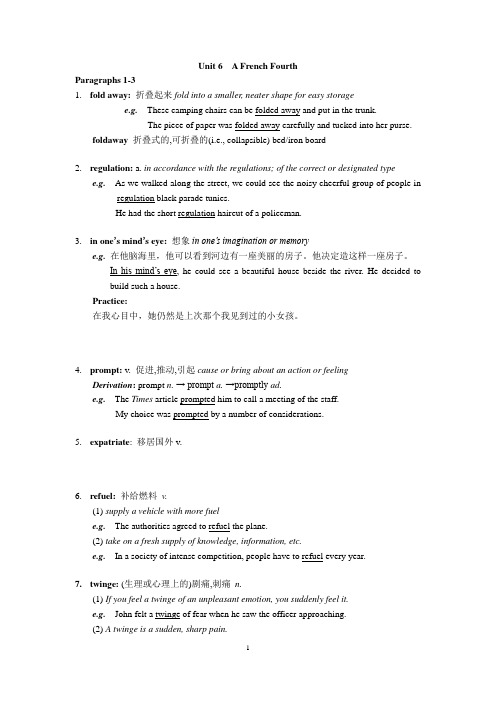
Unit 6 A French FourthParagraphs 1-31.fold away:折叠起来fold into a smaller, neater shape for easy storagee.g. These camping chairs can be folded away and put in the trunk.The piece of paper was folded away carefully and tucked into her purse.foldaway折叠式的,可折叠的(i.e., collapsible) bed/iron board2.regulation: a. in accordance with the regulations; of the correct or designated typee.g.As we walked along the street, we could see the noisy cheerful group of people inregulation black parade tunics.He had the short regulation haircut of a policeman.3.in one’s mind’s eye:想象in one’s imagination or memorye.g.在他脑海里,他可以看到河边有一座美丽的房子。
他决定造这样一座房子。
In his mind’s eye, he could see a beautiful house beside the river. He decided tobuild such a house.Practice:在我心目中,她仍然是上次那个我见到过的小女孩。
4.prompt: v. 促进,推动,引起cause or bring about an action or feelingDerivation: prompt n.→ prompt a.→promptly ad.e.g.The Times article prompted him to call a meeting of the staff.My choice was prompted by a number of considerations.5.expatriate: 移居国外v.6.refuel: 补给燃料v.(1) supply a vehicle with more fuele.g.The authorities agreed to refuel the plane.(2) take on a fresh supply of knowledge, information, etc.e.g.In a society of intense competition, people have to refuel every year.7.twinge: (生理或心理上的)剧痛,刺痛n.(1) If you feel a twinge of an unpleasant emotion, you suddenly feel it.e.g.John felt a twinge of fear when he saw the officer approaching.(2) A twinge is a sudden, sharp pain.e.g.I feel a twinge in my back now and again.8.t urn … to:Paragraph 4-99.be exposed to:面临…受到…处于…作用下暴露在…下to subject or allow to besubjected to an action, influence, or condition. If you are exposed to something dangerous or unpleasant, you are put in a situation in which it might harm you.Derivation: expose v.→exposure n.e.g.Poor John was exposed to the wind and rain.The film was damaged after it was exposed to light. 曝光之后,这个胶片就损坏了。
人教版七年级上册英语重点单词、短语、句型全汇总

人教版七年级上册英语重点单词、短语、句型全汇总Starter Units 1-3: Key Words。
Phrases。
and Sentence StructuresKey Phrases:1.XXX。
afternoon。
or evening respectively2.Good night - a farewell used before going to bed3.Thank you/thanks - an n of gratitude4.In English - using the English language5.CD - a XXX6.XXX - XXX7.NBA - nal Basketball n (in the US)8.P - parking lot or parking space9.kg - kilogram10.S - small size11.M - medium size12.L - large size13.UFO - unidentified flying objectKey XXX Structures:1."Hi。
[name]。
How are you?" - a greeting used to ask how someone is doing2."What's this/that in English?" - a n asking for the English word for something3."What is this/that。
It's [answer]." - a n and answer format for identifying something4."The key is yellow." - a statement identifying the color of an object5."I can say my ABC." - a XXXKey Words:Good: adjective meaning something is of high quality or satisfactoryMorning: noun referring to the d of time een midnight and noonHi/Hello: ns used as greetingsXXX: noun referring to the d of time een noon and eveningEvening: noun referring to the d of time een evening and midnightHow: adverb used to ask about the manner or way of somethingAre: verb used to indicate the state of something or someone You: XXX to the person or people being XXXFine: adjective meaning something is in good health or satisfactoryXXX: XXXOK: XXXWhat: XXX used to ask about somethingIs: verb used to indicate the state or identity of somethingIn English。
初一上册英语第六单元
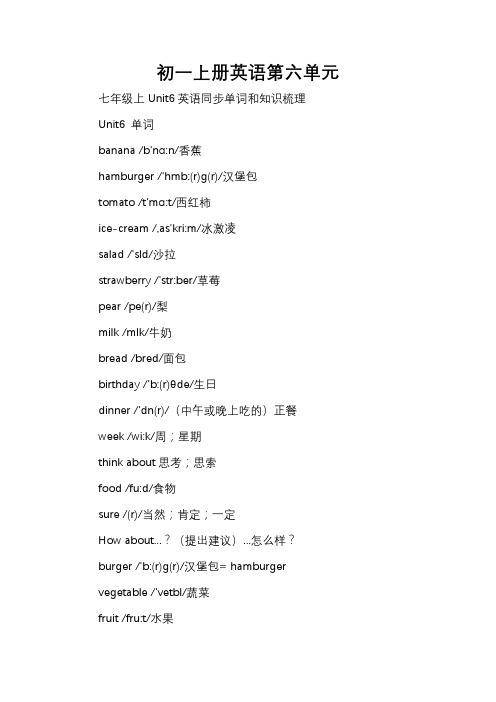
初一上册英语第六单元七年级上Unit6英语同步单词和知识梳理Unit6 单词banana /b'nɑ:n/香蕉hamburger /'hmb:(r)ɡ(r)/汉堡包tomato /t'mɑ:t/西红柿ice-cream /,as'kri:m/冰激凌salad /'sld/沙拉strawberry /'str:ber/草莓pear /pe(r)/梨milk /mlk/牛奶bread /bred/面包birthday /'b:(r)θde/生日dinner /'dn(r)/(中午或晚上吃的)正餐week /wi:k/周;星期think about思考;思索food /fu:d/食物sure /(r)/当然;肯定;一定How about...?(提出建议)...怎么样?burger /'b:(r)ɡ(r)/汉堡包= hamburger vegetable /'vetbl/蔬菜fruit /fru:t/水果right /rat/正确的;适当的apple /'pl/苹果then /en/那么egg /eɡ/蛋;鸡蛋carrot /'krt/胡萝卜rice /ras/大米;米饭chicken /'kn/肌肉so /s/ (引出评论或问题)那么breakfast /'brekfst/早餐;早饭lunch /ln/午餐star /stɑ:(r)/明星;星星eat /i:t/吃well /wel/好;令人满意的habit /'hbt/习惯healthy /'helθi/健康的really /'ri:li/真正地question /'kwesn/问题want /wnt/需要;想要be /bi:/变成fat /ft/肥的;肥胖的Unit6 知识梳理Unit6 Do you like bananas?【重点短语】1. John ’s birthday dinner 约翰的生日宴会2. vegetable salad 蔬菜沙拉3. two tomatoes 两个西红柿4. eat well 吃得营养5. think about 考虑6. eat/have breakfast/lunch/dinner 吃早/午/晚饭7. sports stars 体育明星8. the volleyball star 排球明星9. ask sb. about sth. 问某人某事10. like hamburgers/ice-cream 喜欢汉堡包/冰淇淋11. like eating eggs 喜欢吃鸡蛋12. her eating habits 她的饮食习惯13. be (not) healthy (不)健康14. one last question 最后一个问题15. healthy food 健康食物16. after breakfast/lunch/dinner 早/午/晚饭后【重点句型】1.—Do you like salad? 你喜欢沙拉吗?一Yes,I do. /No, I don’t. 是的,我喜欢。
七年级上册英语内容知识点整理4一6单元

Unit 4: I Have a Pen PalVocabulary:- Ordinary: normal or usual- Request: to ask for something- Reply: an answer or response to a question or request- Chat: to talk in a friendly and informal way- Favourite: preferred above all others- Send: to cause something to be carried or transmitted to a destination- Address: a place where someone lives or a location where something is situated- Receive: to be given, presented with, or paid somethingGrammatical Structures:1. Present simple tense: used to talk about habitual or regular actions.Example: I go to school every day.2. Be verb in the present simple tense: used to talk about permanent states or characteristics.Example: She is tall.3. Question words and question formation:- Wh- questions: used to ask about specific information.Example: Who is your pen pal?- Yes/No questions: used to ask for confirmation or denial.Example: Do you have a pen pal?4. Possessive adjectives: used to show ownership.Example: This is my cat.5. Prepositions of place: used to show the location of something.Example: The pen is on the table.Unit 5: Do you have any hobbies?Vocabulary:- Collect: to bring together a number of things- Stamp: a small piece of paper indicating payment of a fee - Matchbox: a small box in which matches are kept- Build: to construct something by putting parts or materials together- Model plane: a small replica of an airplane- Calligraphy: decorative handwriting or handwritten lettering- Karate: a martial art developed in JapanGrammatical Structures:1. Present simple tense: used to talk about habitual or regular actions.Example: She plays tennis every Saturday.2. Question words and question formation:- Wh- questions: used to ask about specific information.Example: What is your hobby?- Yes/No questions: used to ask for confirmation or denial.Example: Do you collect stamps?3. Frequency adverbs: used to show how often something happens.Example: He often goes swimming.Example: My hobby is more interesting than yours.Unit 6: It's Raining!Vocabulary:- Present: being or occurring in a particular place or position- Rain: moisture condensed from the atmosphere that falls visibly in separate drops- Windy: characterized by or exposed to strong winds- Snowy: characterized by or exposed to falling snow- Sunny: having a bright and shining appearance- Cloudy: covered or obscured by clouds- Temperature: a measure of the warmth or coldness of an object or substanceGrammatical Structures:1. Present simple tense: used to talk about habitual or regular actions.Example: It often snows in winter.2. Be verb in the present simple tense: used to talk about permanent states or characteristics.Example: The weather is usually hot in summer.3. Question words and question formation:- Wh- questions: used to ask about specific information.Example: What's the weather like today?- Yes/No questions: used to ask for confirmation or denial.Example: Is it raining?4. Expressions for describing weather:Example: It's a sunny day.These are the main vocabulary and grammatical structures covered in Units 4-6 of the seventh-grade English textbook. It is important to review and practice these concepts to enhance your understanding and proficiency in English.。
Section+A-Vocabulary词汇课课件 人教版(2024)七年级英语上册

We’re family!
Vacabulary (Section A)
What does family mean to you? (教材27页)
Point 1
mean
1. (及物动词)意思是。meaning n. 意思 2. (及物动词)打算。mean to do sth. 打算做某事 e.g She means to learn the piano. 她打算学习弹钢琴。
Exercise
1. 球棒;球拍 bat 名词
3. 活动 activity
副词 5. 在一起;共同 together
动词 7. 花(时间、钱等) spend
2. 成员;会员 member 4. 国际象棋 chess 6. 非常;确实;真正地 really
Exercise
spend
1. (动词)花(时间、钱等) spend,spent,spent
➢ I spend too much time watching television.
➢ I spend $100 buying a new dress.
(sb. +spend +时间/金钱+(in)doing sth. 花时间/金钱做某事。)
She can play it really/ very well.(教材21页)
Point 5
really
1. (副词)非常;确实;真正地。
➢ They are not really my aunt and uncle. really 位于be动词之后。
➢ I really want to learn the piano. really 位于实义动词之后。 2. really= real(形容词) + ly(副词后缀)
优翼学练优英语七年级上册第六单元作文

优翼学练优英语七年级上册第六单元作文全文共3篇示例,供读者参考篇1Unit 6 In Destiny, There Are Many Challenges, What to Do?In life, we will encounter many challenges, and how we deal with them is crucial. Destiny can be unpredictable, throwing us curveballs when we least expect it. However, with the right mindset and actions, we can overcome any obstacles that come our way.First and foremost, it is essential to stay positive when facing challenges. Positivity can help us see the silver lining in any situation, no matter how difficult it may seem. By focusing on the good and maintaining a hopeful outlook, we can navigate through challenges with resilience and grace.Furthermore, having a plan in place can help us tackle challenges more effectively. It is essential to assess the situation, identify the root cause of the problem, and come up with a strategic plan to overcome it. By breaking down the challenge into smaller, manageable steps, we can make progress towards finding a solution.Moreover, seeking support from friends, family, or mentors can provide valuable guidance and encouragement when facing challenges. Surrounding ourselves with a supportive network of people who believe in us can boost our confidence and morale, making it easier to persevere through tough times.In addition, it is crucial to maintain a growth mindset when dealing with challenges. Instead of viewing obstacles as setbacks, we can see them as opportunities for growth and learning. By embracing challenges as a chance to improve and develop new skills, we can emerge stronger and more resilient than before.Finally, it is essential to stay disciplined and focused when tackling challenges. By staying committed to our goals and putting in the necessary effort and hard work, we can overcome any obstacle that comes our way. With dedication and perseverance, we can turn challenges into stepping stones towards success.In conclusion, facing challenges is an inevitable part of life, but how we respond to them can make all the difference. By staying positive, having a plan, seeking support, maintaining a growth mindset, and staying disciplined, we can conquer any obstacle that comes our way. In destiny, there are manychallenges, but with the right mindset and actions, we can navigate through them with strength and resilience.篇2Unit 6 Making PlansIn Unit 6 of the Grade 7 English textbook, we learned about making plans. Making plans is important because it helps us stay organized, manage our time effectively, and achieve our goals. In this unit, we discussed various ways of making plans, such as using a planner, setting goals, and prioritizing tasks.One of the key concepts we learned in this unit is the importance of setting SMART goals. SMART goals are Specific, Measurable, Achievable, Relevant, and Time-bound. By setting SMART goals, we can have a clear idea of what we want to achieve and how we can accomplish it. For example, instead of saying "I want to improve my English", a SMART goal would be "I want to increase my English vocabulary by 100 words in the next month". Setting SMART goals helps us stay focused and motivated.Another important topic we covered in this unit is time management. We learned about the importance of prioritizing tasks, using a planner to schedule our activities, and avoidingprocrastination. By managing our time effectively, we can make the most of our day and ensure that we have enough time to complete our tasks.Overall, Unit 6 of the Grade 7 English textbook provided us with valuable information on how to make plans and achieve our goals. By applying the skills and strategies we learned in this unit, we can improve our time management skills, stay organized, and work towards our objectives. Making plans is a crucial skill that will benefit us not only in our academic studies but also in our personal and professional lives.篇3Unit 6 Can you come to my party?It was a sunny Saturday afternoon, and I was excited because I was having a party later that day. I had invited all of my friends from school to come and celebrate with me. I had spent all week planning the party—decorating the house, buying snacks and drinks, and creating a fun playlist of music.As the time for the party approached, I anxiously waited for my friends to arrive. The first to show up was my best friend, Sarah. She came early to help me set up and make sure everything was perfect. Then, one by one, the rest of my friendsstarted to arrive. There was laughter and chatter as we all caught up with each other and enjoyed the party games and snacks.I was having a great time, but I couldn't help but notice that one of my friends, Amy, still hadn't shown up. I sent her a text message to see if she was on her way, but she didn't respond. I started to worry that something had happened and she wouldn't be able to make it to the party.Just as I was starting to feel disappointed, the doorbell rang. It was Amy, with a big smile on her face and a present in her hands. She apologized for being late and explained that she had gotten lost on the way to my house. I was so relieved to see her and happy that she had made it to the party.The rest of the evening flew by in a blur of music, games, and laughter. I felt so lucky to have such wonderful friends who had come to celebrate with me. As the party came to an end and my friends started to leave, I knew that I would always remember this day as one of the best days of my life.I couldn't help but smile as I thought about all the fun we had had together and all the memories we had created. I was grateful for my friends and for the happiness they brought into my life. And as I cleaned up after the party and said goodbye tothe last of my guests, I knew that I couldn't wait to do it all again next year.In conclusion, my party was a huge success, and I was grateful for all the friends who had come to celebrate with me. I couldn't have asked for a better way to spend a Saturday afternoon, and I knew that I would always cherish the memories of that day. I felt lucky to have such amazing friends, and I couldn't wait to see what other adventures we would have together in the future.。
2023七年级上册英语单词表苏教版

2023七年级上册英语单词表苏教版Unit1:Greetings and Introduction1.Hi:Used to greet someone or to attract attention.2.Hello:A common greeting used to say"hi"or start a conversation.3.Good morning:Used to greet someone in the morning until around noon.4.Good afternoon:Used to greet someone in the afternoon until around6p.m.5.Good evening:Used to greet someone in the evening.6.How are you?:A common question to ask about someone's well-being.7.I'm fine,thanks:A common response to"How are you?", indicating that one is doing well.8.Nice to meet you:A polite phrase used when meeting someone for the first time.9.What's your name?:A question used to ask someone's name.10.My name is...:A response to"What's your name?", introducing oneself.Unit2:Personal Pronouns1.I:Used to refer to oneself as the speaker.2.You:Used to refer to the person spoken to or being addressed.3.He:Used to refer to a male person or being.4.She:Used to refer to a female person or being.5.It:Used to refer to an object,animal,or thing.6.We:Used to refer to a group of people that includes oneself.7.They:Used to refer to multiple people or things.Unit3:Numbers1.One:The number1.2.Two:The number2.3.Three:The number3.4.Four:The number 4.5.Five:The number 5.6.Six:The number6.7.Seven:The number7.8.Eight:The number8.9.Nine:The number9.10.Ten:The number10.Unit4:School Subjects1.English:The subject that involves studying the English language.2.Math:The subject that involves studying numbers, calculations,and equations.3.Science:The subject that involves studying the natural world and its phenomena.4.History:The subject that involves studying past events and their significance.5.Geography:The subject that involves studying the Earth's physical features,climate,and distribution of plants,animals,and human populations.6.Art:The subject that involves studying and creating visual or performing arts.7.Music:The subject that involves studying and learning about music and musical instruments.8.Physical Education(PE):The subject that involves physical activities and sports.puter Science:The subject that involves studying computers,programming,and technology.10.Chinese:The subject that involves studying the Chinese language and its culture.Unit5:Family1.Mother:A female parent.2.Father:A male parent.3.Sister:A female sibling.4.Brother:A male sibling.5.Grandmother:The mother of one's father or mother.6.Grandfather:The father of one's father or mother.7.Aunt:The sister of one's father or mother.8.Uncle:The brother of one's father or mother.9.Cousin:The child of one's aunt or uncle.10.Family:A group of people related by blood or marriage.Please note that this is just a sample of the words included in the2023seventh-grade English vocabulary list, Su edition.For the complete list,please refer to the official textbook or additional study materials provided by your school.。
人教版七年级英语上册英语单词表
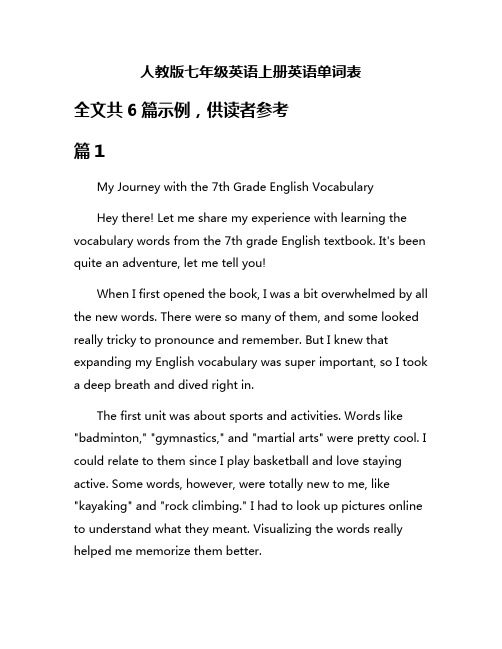
人教版七年级英语上册英语单词表全文共6篇示例,供读者参考篇1My Journey with the 7th Grade English VocabularyHey there! Let me share my experience with learning the vocabulary words from the 7th grade English textbook. It's been quite an adventure, let me tell you!When I first opened the book, I was a bit overwhelmed by all the new words. There were so many of them, and some looked really tricky to pronounce and remember. But I knew that expanding my English vocabulary was super important, so I took a deep breath and dived right in.The first unit was about sports and activities. Words like "badminton," "gymnastics," and "martial arts" were pretty cool. I could relate to them since I play basketball and love staying active. Some words, however, were totally new to me, like "kayaking" and "rock climbing." I had to look up pictures online to understand what they meant. Visualizing the words really helped me memorize them better.Then came unit two, which focused on animals. I was really excited about this one because I love animals! Learning words like "panda," "kangaroo," and "elephant" was a breeze. But then I stumbled upon "aardvark" and "quokka" – those weretongue-twisters! I practiced saying them out loud a million times until I got them right.Unit three was all about food and drinks. Yum! Words like "pizza," "spaghetti," and "ice cream" made me hungry just thinking about them. But then there were others like "couscous" and "guacamole" that sounded totally foreign to me. I had to ask my mom to explain what they were. Turns out, guacamole is this delicious avocado dip that I now absolutely love!The units kept coming, and with each one, I encountered a whole new set of vocabulary words to learn. Some wereeasy-peasy, while others required extra effort. But you know what? The more words I learned, the more confident I became in my English skills.There were times when I felt frustrated, like when I just couldn't seem to remember the difference between "borrow" and "lend." But I didn't give up. I made flashcards, played word games, and even asked my English teacher for help. Little by little, the words started sticking in my brain.Now, as I flip through the pages of my 7th grade English book, I feel a sense of pride. I can read and understand so many more words than I could before. It's like I've unlocked a whole new world of knowledge and communication.Learning all these vocabulary words hasn't just improved my English; it's also taught me valuable lessons about perseverance and hard work. I've realized that with dedication and the right strategies, I can tackle even the most challenging words and concepts.So, to all my fellow students out there, keep pushing forward with your vocabulary studies. It might seem daunting at times, but trust me, the rewards are worth it. Who knows, maybe one day we'll be able to have entire conversations using only the words we've learned from our English textbooks!For now, I'll leave you with a few of my favorite words from the 7th grade book: "extraordinary," "phenomenal," and "incredible." Because that's exactly how I feel about my journey with English vocabulary – it's been extraordinary, phenomenal, and incredibly rewarding!篇2My Big List of Cool English WordsHi everyone! I'm a 7th grader and I love learning English. Our new English textbook has so many awesome words that I want to share my favorite ones with you. Get ready to learn some really neat vocabulary!Let's start with some basic words about people and things around us. "Facial" means about the face, like facial features or a facial expression. "Identity" is who you are - your name, appearance, personality etc. "Uniform" is the same outfit worn by a group like a school uniform or military uniform.Now for some words about personality traits and emotions. If someone is "active" they are energetic and like moving around a lot. An "amateur" is someone who does an activity for fun, not as a job. If you are "confident" you feel sure of yourself. But if something makes you "insecure" you feel unsure or anxious.Describing people's behavior and routines is handy too. If you "apologize" you say you're sorry for something you did wrong. To "concentrate" means to focus carefully. If you "delay" something, you put it off until later. And a "generation" refers to all the people born around the same time, like my parents' generation or my grandparents' generation.Let's talk about some awesome outdoor words! "Farmland" is land used for growing crops. A "slope" is ground that isn't flatbut tilted. A "swamp" is a wetland area with lots of Water and mud. And a "wilderness" is a wild, uncultivated region like a forest.Now for some science vocabulary that's out of this world - literally! An "asteroid" is a rocky object orbiting the sun. "Gravity" is the force that pulls things toward each other, like keeping us stuck to Earth. The "universe" is ALL the galaxies, stars, planets and everything that exists. And a"supernova" is an explosion of a giant star at the end of its life cycle.I love words about technology and modern life too. "Electronic" describes things that run on electricity like computers. An "engineer" is someone who designs and builds machines or structures. If something is "virtual" it's created by computers to seem real. And a "username" is what identifies you online, like for email or games.Let's mix things up with some cool adjectives! If something is "ancient" it's really, really old from long ago. "Domestic" things relate to the home or family life. And if an animal is "tame" it's not wild or dangerous.I can't forget words about time and numbers. A "billion" is a crazy big number - 1,000,000,000! If something happens "daily" it occurs every single day. The "previous" thing came right beforethe latest one. And something "triple" has three times as much of it.Phew, that's a ton of stellar English vocabulary! Thanks for reading my big list of fascinating words. I hope you learned some new ones and are inspired to expand your English skills. We students have to stick together and keep building our knowledge. Catch you later, word nerds!篇3My 7th Grade English Vocab WordsHi there! I'm a 7th grader in China and I just started using a new English textbook this year. It has a bunch of new vocabulary words that we're supposed to learn. Some of them are pretty tricky, but a lot of them are super useful words that I can use when talking to my English-speaking friends from other countries online.I made a list of all the vocab words from the first few units so I could study them better. I'll share my list with you and let you know which ones I've found to be the most helpful so far. Maybe you can learn some of these handy English words too!Unit 1 was all about introducing yourself and describing your family. Some key words were:Relative - This just means a family member like your mom, dad, grandparents, etc.Nephew - The son of your brother or sisterOccupation - This is what job or profession someone hasRetired - When someone has stopped working after a career, usually because they are oldOne word I thought was really funny is "sibling." It just means your brother or sister, but it sounds like a weird alien word! I like calling my little brother my "sibling" now to bug him.In Unit 2, we learned words for describing personalities and emotions:Confident - Being sure of yourself and what you can doOptimistic - Having a positive attitude and expecting good thingsInsecure - Feeling doubtful, worried, or lackingself-confidenceDelighted - Very happy and pleased about somethingAnnoyed - Feeling bothered, irritated, or upset about somethingI can use these to describe how I feel about things, like "I was delighted to get an A on my math test!" Or "My annoying sibling keeps bugging me!"Unit 3 taught us home vocabulary like:Furniture - Things like chairs, tables, beds, etc.Appliances - Machines in the home like the oven, microwave, etc.Spacious - Having a lot of room or spaceCozy - Small but comfortable and niceMy room is pretty cozy and not super spacious. But our living room is a very spacious area with lots of furniture.Unit 4 was about school items and subjects:Tuition - The money you pay to attend a schoolEnroll - To officially sign up or register for a schoolGymnasium - A room or building for sports and exercise (gym for short)Arithmetic - Another word for math, specifically working with numbersMy parents just had to pay the tuition to enroll me at my new middle school. I'm not a huge fan of arithmetic, but at least I get exercise in the gymnasium!Those are just some of the new words I'm learning in my 7th grade English textbook so far. There are a ton more vocab words to cover, like describing personalities, places, food, holidays, and more.Learning all these words has been helping me communicate better in English with friends from places like the U.S., U.K., Canada, and Australia that I chat with online. It's allowing me to understand them better and express myself more clearly.Some of the words seemed weird at first, but once I learned their meanings and started using them, they've become a normal part of my English vocabulary. Who knows, maybe in a few years "sibling" won't sound so silly anymore!Well, I've got to get back to studying. Let me know if you need any tips on memorizing vocabulary words. I'm always happy to share strategies to make learning English a little easier. Catch you later!篇4Vocab Journey: A 7th Grader's TaleHey there! I'm a 7th grader, and let me tell you, this year's English vocab has been quite an adventure. At first, I was a bit nervous about all the new words we'd have to learn, but it turns out, it's been a ton of fun! Let me take you through my vocab journey this year.It all started on the first day of school when our English teacher handed us our new textbooks. I flipped through the pages, and to be honest, some of the words looked pretty intimidating. Words like "acquaintance," "pursue," and "spontaneous" seemed like they'd be a mouthful to learn. But our teacher assured us that we'd tackle them one by one, and before we knew it, they'd become our friends.The first unit was all about daily life and routines. We learned words like "chore," "schedule," and "procrastinate" (that last one is my middle name, if I'm being honest!). It was pretty cool to have words to describe the little things we do every day. Suddenly, my mundane routine didn't seem so boring anymore.Then we moved on to unit two, which was all about food and cooking. I have to admit, some of those words made my mouthwater! Words like "appetizer," "cuisine," and "savor" made me want to become a chef. I even tried to impress my parents by using some of the new vocab during dinner conversations. Let's just say my attempts at being fancy didn't always go over well.Unit three was all about nature and the environment. I loved learning words like "conservation," "renewable," and"eco-friendly." It made me realize how important it is to take care of our planet. Plus, using those words made me sound super smart whenever we had discussions about environmental issues in class.Next up was unit four, which covered technology and innovation. I have to say, some of those words were real tongue-twisters! "Semiconductor," "bandwidth," and "obsolete" were tough ones to wrap my tongue around. But once I got the hang of them, I felt like a total tech whiz.Unit five was all about arts and culture, and let me tell you, those words were just beautiful. Words like "masterpiece," "virtuoso," and "renaissance" made me feel like a true artist (even though my stick figure drawings say otherwise). I started using those words to describe everything from my mom's cooking to my little brother's dance moves.Then came unit six, which was all about sports and fitness. I have to admit, I was a little disappointed when I first saw words like "cardiovascular," "agility," and "endurance." They just didn't seem as fun as some of the other units. But once I started using them during P.E. class, I realized how useful they could be. Plus, they made me sound like a total pro when I was talking about my favorite sports teams.Unit seven was all about travel and adventure, and those words had me dreaming of far-off lands. Words like "exotic," "expeditious," and "itinerary" made me want to pack my bags and hit the road. I even started planning imaginary trips using all the new vocab I'd learned.Finally, we reached unit eight, which covered social issues and current events. I'll be honest, some of those words were pretty heavy, like "discrimination," "stigma," and "inequality." But learning them made me feel like I was becoming a more informed and socially conscious person. I started paying more attention to the news and using those words to discuss important issues with my friends and family.Looking back, I can't believe how many new words I've learned this year. Each unit felt like a new adventure, and everyword was like a little piece of a puzzle that helped me understand the world around me better.And you know what? She was right. These days, I find myself using all sorts of new words without even thinking about it. They've become a natural part of my vocabulary, and I feel like I can express myself more clearly and confidently than ever before.So, to all my fellow 7th graders out there, embrace the vocab journey! It might seem daunting at first, but trust me, it's worth it. Who knows, maybe by the end of the year, you'll be using words like "acquaintance" and "spontaneous" like it's no big deal.And to all the future 7th graders out there, get ready for an adventure! Learning new vocab might seem like a chore at first, but once you dive in, you'll realize it's a whole new world of expression and understanding just waiting to be explored.So, what are you waiting for? Let's get this vocab party started!篇5Learning New English Words: A Fun Adventure!Hello everyone! My name is Xiao Ming and I'm a 7th grader at a school in Beijing. One of my favorite subjects is English class because I love learning new words. Our English textbook this semester has so many interesting new vocabulary words and I want to share with you my journey of exploring them.The first unit was all about "Ways of Life" and introduced words like "diverse", "identity", "embrace", and "discrimination". At first some of these words seemed quite difficult, but my teacher explained them really well using examples. "Diverse" means having many different types, like the diverse cultures we have in China with various ethnic groups. "Identity" refers to who you are, like being Chinese is part of my identity. To "embrace" something means to accept it warmly, like how we should embrace diversity. And "discrimination" sadly means treating someone unfairly because of their race, gender, or other factors. Learning these vocabulary words helped me understand how we need to respect all the diverse ways of life in our world.The next unit covered "Environmental Protection" and taught us eco-friendly words like "renewable", "sustainable", "conserve", and "carbon footprint". My favorite was "renewable" which describes energy sources like solar and wind power that can be replenished naturally. Understanding "sustainable" wasalso important - it means meeting our current needs without compromising the needs of future generations. To "conserve" means to protect natural resources from being wasted or used up too quickly. And we all need to reduce our "carbon footprint" which is the amount of greenhouse gases we produce from burning fossil fuels. After learning these terms, I'm so motivated to live an eco-friendly lifestyle!Then in the "Sports and Fitness" unit, we learned awesome words like "perseverance", "optimistic", "resilient", and "sportsmanship". Having "perseverance" means continuing to try hard even when something is really difficult. It's important to stay "optimistic" and have a positive mindset. Being "resilient" means you can recover quickly from setbacks or failures. And "sportsmanship" is about playing games fairly, respecting the rules and your opponents. These words inspire me to always do my best, never give up, and be a good sport whether I win or lose.The "Travel and Transportation" unit was my favorite because who doesn't love traveling? New words included "itinerary", "sightseeing", "jet lag", and "souvenir". An "itinerary" is the schedule of your travel plans. When you visit famous places or scenery, that's called "sightseeing". Ugh, "jet lag" is theworst - it's that tired feeling you get after traveling across time zones. But it's worth it to bring home fun "souvenirs" which are little gifts or objects that remind you of your trip. Learning these vocab words got me really excited to travel more with my family over summer break!There were so many other amazing units and word lists covering topics like technology, health, career choices, and more. Each new word was like discovering a piece of treasure that opened my eyes to different ideas and perspectives. Studying this vocabulary didn't feel like work at all - it felt like going on an exciting adventure of learning and growth.My advice to other students is: don't be afraid of new words! Break them down, look at the roots and meanings, make connections to words you already know. Use them in sentences and real conversations. The more you immerse yourself in new vocabulary, the more it will stick. And most importantly, have fun with it! Words are the building blocks of language that allow us to explore endless ideas and express ourselves in colorful, profound ways.As I continue learning English, I know there will always be new words to discover and add to my vocabulary collection. Each one is a tiny key that unlocks another door to understandingdifferent cultures, communicating with others, and seeing the world from fresh perspectives. I can't wait to explore more of this endlessly fascinating world of words! Who's ready to join me on this adventure?篇6A Big List of New English WordsHi everyone! I'm so excited to share all the new English vocabulary words I've learned this year. I just started 7th grade and we have a brand new English textbook. It's really thick and has loads of new words. At first, I was a bit worried I wouldn't be able to learn them all. But my teacher says if we study a little bit each day, soon they will become easy for us. She's always encouraging us and making learning fun.Let me tell you about some of the highlights from Unit 1. We started with words related to household items and furniture. Cushion, rug, armchair, bookcase - I had to really practice those. My mom helped me by pointing to things around our home. Speaking of home, I learned some new rooms too like basement, attic, and garage. The attic is that space right under the roof where we store old things.Then we moved on to foods and drinks. I'm sure you know apple, banana, and milk already. But how about pancake, popcorn, and lemonade? Those all look delicious! I tried making lemonade at home by squeezing fresh lemons. It was so refreshing on a hot day. And don't even get me started on popcorn - my favorite movie snack!We learned lots of adjectives to describe things too. Adjectives like beautiful, handsome, gorgeous, fantastic, and breathtaking. I love using fun adjectives to spice up my writing and speech. Like "Wow, that butterfly was breathtakingly beautiful!" Or "The talented singer has a gorgeous voice." Using vivid adjectives really brings your language to life.Let's see, what else was there? Oh yes, emotions! We covered the basics like happy, sad, angry, and scared. But also some more advanced ones like embarrassed, jealous, impatient, and relieved. Like when you've been holding it forever and finally get to use the restroom - what a relieved feeling! Or when your friend gets the toy you really wanted for their birthday, making you feel a tad jealous. Having the vocabulary for emotions helps us understand ourselves and others better.Ooh ooh, and we can't forget about verbs - you know, the action words. We studied a ton like whisper, shout, borrow, lend,search, and discover. I really like discovering new things, don't you? Like discovering a new favorite book, game, or food. Speaking of discovering, I also learned the verb "explore" which means to travel through some area to learn about it. I want to explore more of our city's parks and forests. And one day, I'd love to explore jungles and ancient ruins like a real explorer! Can you imagine?I better pause here, as I could just go on and on about all the neat words I'm learning. Numbers, dates, colors, animals, and so much more - my brain is just soaking it all up like a sponge! Having a rich vocabulary helps me understand the world better and communicate more clearly. While it's challenging for sure, I'm going to keep working hard. Once you start unlocking the meanings of words, it's like entering an entirely new world.Well, thanks for listening (or reading, I guess!) I'll have to tell you about the rest of the units another time. For now, I'm off to review my vocabulary flashcards. Maybe I'll make a fun game out of it to help me practice. Let me know if you'd like to join - the more the merrier when it comes to learning new words!。
2024新人教版英语七年级上UNIT 6 A Day in the Life单词表
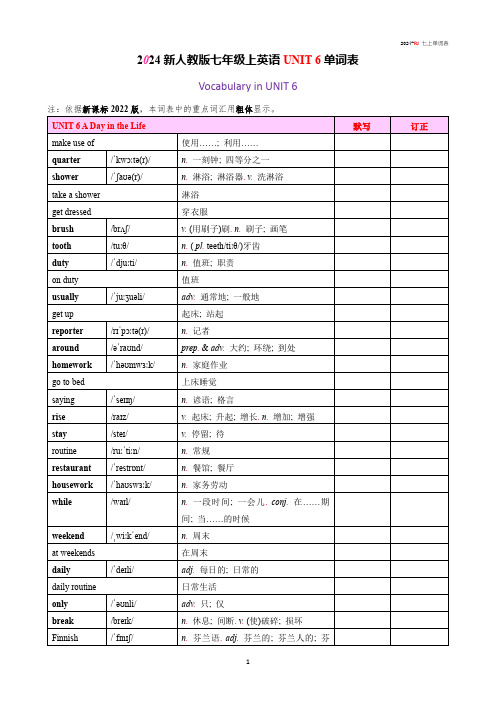
n.淋浴;淋浴器.v.洗淋浴
take a shower
淋浴
get dressed
穿衣服
brush
/brʌʃ/
v.(用刷子)刷.n.刷子;画笔
tooth
/tuːθ/
n.(pl.teeth/tiːθ/)牙齿
duty
/ˈdjuːti/
n.值班;职责
on duty
值班
usually
/ˈjuːʒuəli/
/ˈevrideɪ/
adj.每天的;日常的
prepare
/prɪˈpeə(r)/
v.把……备好;准备
prepare sth for
为……把某物准备好
Timo
/ˈtiːməʊ/
蒂莫
Halla
/ˈhɑlɑ/
哈拉
Helsinki
/helˈsɪŋki/
赫尔辛基(芬兰首都)
Finland
/ˈfɪnlənd/
芬兰
stay
/steɪ/
v.停留;待
routine
/ruːˈtiːn/
n.常规
restaurant
/ˈrestrɒnt/
n.餐馆;餐厅
housework
/ˈhaʊswɜːk/
n.家务劳动
while
/waɪl/
n.一段时间;一会儿.conj.在……期间;当……的时候
weekend
/ˌst/
n.早餐
before
/bɪˈfɔː(r)/
prep.&conj.在……以前.adv.以前
begin
/bɪˈɡɪn/
v.开始
dinner
/ˈdɪnə(r)/
- 1、下载文档前请自行甄别文档内容的完整性,平台不提供额外的编辑、内容补充、找答案等附加服务。
- 2、"仅部分预览"的文档,不可在线预览部分如存在完整性等问题,可反馈申请退款(可完整预览的文档不适用该条件!)。
- 3、如文档侵犯您的权益,请联系客服反馈,我们会尽快为您处理(人工客服工作时间:9:00-18:30)。
Tell the opposites of the following words:
left first early up with light expensive right small sad
happy
cheap big dark
last
late down without
Language points
Passage 1 :
Ben is my good friend. He likes wearing a T-shirt, jeans and trainers very much. He thinks they are comfortable enough to play games. Ben likes sports, so he likes to wear clothes made of cotton.
a white suit 一件白套装
Millie is wearing a white suit.
a white and blue T-shirt
一件蓝白相间的T恤 Daniel is wearing a white and blue
T-shirt.
丹尼尔穿着一件蓝白相间的T恤
jumper 套头衫 shorts 短裤 suit 套装, 一套衣服 heavy 重的 light 轻的 boring 乏味的, 无聊的 a boring meeting
Translate the following into English:
wear a yellow jumper 1. 穿着一件黄色的套ellow T-shirt 2. 一件蓝黄相间的T恤衫 ______________________ a pair of red boots 3. 一双红色的长筒靴 ________________________ 4. 一条灰色的短裤 5. 一件粉色的套装 6. 一条丝绸围巾 a pair of grey shorts ______________________
Amy is wearing a yellow jumper.
艾米穿着一件黄色的套头衫。
a red skirt
一条红短裙
Sandy is wearing a red skirt. 仙蒂穿着一条红短裙。
a black jacket
一件黑色的夹克衫
Simon is wearing a black jacket. 西蒙穿着一件黑色的夹克衫。
a heavy box
A) What are they wearing?
Kitty is writing captions for some other pictures from the fashion show. Write the correct letters in the boxes on page 96.
feel warmer.
Homework
Write an article about the clothes you like to wear!
Unit6 Fashion
Vocabulary
shorts
短裤
a pair of shorts 一条短裤 Simon is wearing a pair of shorts.
西蒙穿着一条短裤。
This pair of shorts is for you. 这条短裤是给你的 。 jumper 套头衫
Passage 2:
It is a cold day. Amy is going to wear some warm clothes like a wool jumper, a long wool coat and a pair of leather boots. I’d like to choose a yellow jumper and an orange coat, because I think both of these colors will make me
1. Please describe what your classmates wearing. 2. Describe your favorite clothes you like to wear.
B) Describing fashion
Match the words on the left with their opposites on the right. interesting heavy old black long light new boring short white
a pink suit ______________________
a silk scarf _____________________
Please draw pictures according to the following passages and then introduce the pictures to your classmates in English.
light adj. 轻的,明亮的
(1)light 的反义词是heavy 或 dark. eg. The bottle is light.瓶子很轻。 It’s beginning to get light. 天渐渐亮起来了。 (2)n. 灯, 光 Her light is on her desk. 她的灯在桌子上。 Light travels much faster than sound.光比声音传播得快。
heavy adj. 重的,沉的
heavy反义词是light,其副词形式是heavily。 eg. This box is so heavy. 这盒子是如此重。 It is raining heavily.外面雨下得很大。
boring adj. 乏味的,无聊的
boring的反义词是interesting eg. The film is so boring that we don’t want to see it any longer. 这电影如此无聊以至于我们不想看了。
